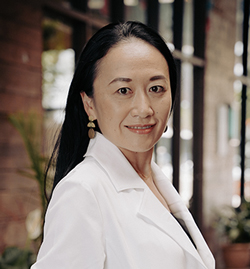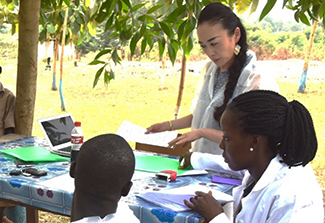Global health mentorship today: Rie Yotsu, MD, MIPH, DTM&H, PhD
July/August 2024 | Volume 23 Number 4
 Photo courtesy of Rie Yotsu Rie Yotsu, MD, MIPH, DTM&H, PhD
Photo courtesy of Rie Yotsu Rie Yotsu, MD, MIPH, DTM&H, PhD
Rie Yotsu is an associate professor at the Tulane School of Public Health & Tropical Medicine, Tulane University.
In the beginning of my career, I was a general surgeon. I always thought of doing surgeries as having skills, while dermatology was more about knowledge. But having knowledge is also a skill, I realized over time. In dermatology, you see the patient and you can diagnose without any laboratory tests—not with all conditions, but with 70% to 80% of them. When I started working in global health and going to countries without access to labs, I was still able to do things because I possess this skill of knowledge.
Early in my career, I did not see many senior dermatologists doing global health. When I finished my master's degree in the U.K., I wanted to combine my interests and the only disease that came to mind was Hansen's disease (leprosy). So I trained in leprosy in Ethiopia. When I returned to Japan, I got a fellowship position at a hospital in Tokyo. On my first day there, the dean called me and asked if I'd be interested in working on leprosy. Two weeks later, I found myself on a small island in southern Japan.
There my passion began. Leprosy is a neglected tropical disease (NTD), and, over time, I began working with other tropical diseases and doing research focused on diagnostics in relation to both dermatology and public health. In Côte d'Ivoire, my Fogarty-funded project is MIND-the-SKIN. We are testing a digital tool for patient recordkeeping that can be used by frontline health care workers to communicate with a specialist. With all the clinical data, including images that we collect, we are also trying to develop an AI system to help screen and diagnose patients. Accurate, early-stage diagnoses and good epidemiological data help improve disease control measures.
 Photo courtesy of Rie YotsuRie Yotsu of Tulane University talks with mentees during a clinic in Côte d'Ivoire.
Photo courtesy of Rie YotsuRie Yotsu of Tulane University talks with mentees during a clinic in Côte d'Ivoire.
I have been fortunate to have different types of mentors at various stages of my career, each fitting perfectly that particular career stage. During my dermatology training, I had a great mentor who pushed me to complete my dermatology license, even though I was inclined towards global health. Having expertise in a specific field is crucial—I cannot imagine what path I would have taken without his guidance. My mentor in the leprosy field provided opportunities for me to work internationally by involving me in many international conferences. Currently, my mentor at Tulane University is a great manager and leader; at this stage in my career, he’s the mentor I need.
I have mentored students from the U.S., Japan, and Côte d'Ivoire, as well as mentees from various continents through my work with different academic institutions and the WHO network. I also run an NGO, Clover Health International, where I mentor youth who are working on NTDs.
When approached for mentorship, I take time to discuss their goals. I look for three qualities. First, do they have respect? For example, if I wait in the Zoom meeting room but the mentee doesn’t show up, that's not showing respect. The second quality I look for is passion. Some medical students in the U.S. just want to have a global health project to put on their CV. That’s not enough. Third, I look for open communication. There was one student at Nagasaki University. Her English was poor, requiring me to edit almost all of her work initially, but she had these three qualities: respect, passion, and open communication. She's still working with me.
By open communication, I don’t necessarily mean always being in constant contact. Communication is different from culture to culture. For example, in Japan or Côte d’Ivoire, people may not want to “bother” you if you are senior to them. So I may have to understand why a student might not be communicating and reach out to them. Open communication means being willing to share thoughts, ask questions, and provide updates, even if it requires overcoming cultural barriers.
I've been running my project in Côte d'Ivoire for more than 10 years now. There's no formal mentorship system there, still people have learned from what I’ve done—writing the project proposals, submitting ethics approvals, developing survey sheets. Now they’re doing much of this work themselves, and some even went on to work with the Ministry of Health and other international organizations. That may not be good for the project, but I'm happy for them!
Links:
Updated August 14, 2024
To view Adobe PDF files,
download current, free accessible plug-ins from Adobe's website.
Related Fogarty Programs
Related World Regions / Countries
Related Global Health Research Topics